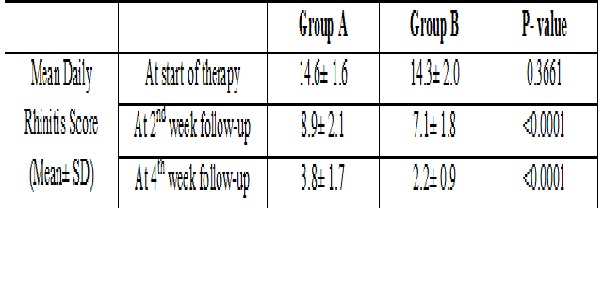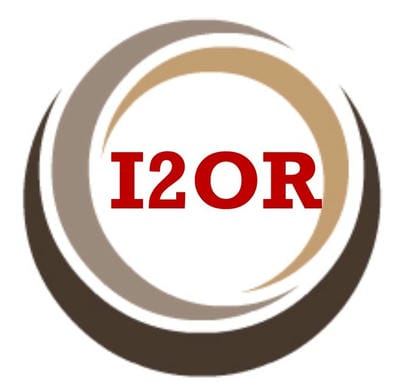Role of nasal douching in chronic allergic rhinitis
Abstract
Objective: The present study was carried out to evaluate the role of nasal douching in the treatment of allergic rhinitis using daily allergic rhinitis symptom score.
Material & Methods: 120 patients of chronic allergic rhinitis who attended otorhinolaryngology outdoor of Ananta Institute of Medical Sciences, Rajsamand, Rajasthan were included in the study.patients were divided into two equal groups viz. group A (n=60) in which patients were treated with antihistamincs, leukotriene receptor antagonists and intranasal steroid sprays and group B (n=60) in which isotonic saline nasal douching was advised to the patients three times a day as an adjunctive to the medical treatment. Patients were followed up after 2 week and 4 weeks. Mean daily allergic rhinitis symptom score were calculated at each follow up and compared between the two groups.
Results: out of 120 patients, 63 were male and 57 were female. Age of the patients ranges from 20 to 60 years with the mean age of 36.5 years. Mean daily rhinitis scores of group A and group B were 14.6±1.6 and 14.3±2.0 respectively (p value- 3.661) which was reduced to 8.9±2.1 and 7.1±1.8 respectively and the difference was found to be statistically significant ( p value <0.0001). At 4th week follow up, the scores of were further reduced to 3.8±1.7 and 2.2±0.9 respectively and the difference was found to be statistically significant (p value <0.0001).
Conclusion: Nasal douching is an effective method to manage symptoms of allergic rhinitis when used along with other medical treatment including intranasal steroids, antihistaminics and leukotriene receptor antagonists.
Downloads
References
2. Juniper EF. Impact of upper respiratory allergic diseases on quality of life. J Allergy Clin Immunol. 1998 Feb;101(2 Pt 2):S386-91.[pubmed]
3. Marshall PS, O'Hara C, Steinberg P. Effects of seasonal allergic rhinitis on fatigue levels and mood. Psychosom Med. 2002 Jul-Aug;64(4):684-91.[pubmed]
4. Bousquet J, Neukirch F, Bousquet PJ, et al. Severity and impairment of allergic rhinitis in patients consulting in primary care. J Allergy Clin Immunol. 2006 Jan;117(1):158-62. Epub 2005 Dec 2.[pubmed]
5. Tanner LA, Reilly M, Meltzer EO, Bradford JE, Mason J. Effect of fexofenadine hydrochloride on quality of life and work, classroom, and daily activity impairment in patients with seasonal allergic rhinitis. Am J Managed Care. 1999 April; 5 (4):S235–S247.
6. Blanc PD, Trupin L, Eisner M, et al. The work impact of asthma and rhinitis: findings from a population-based survey. J Clin Epidemiol. 2001 Jun;54(6):610-8.[pubmed]
7. Wilken JA, Berkowitz R, Kane R. Decrements in vigilance and cognitive functioning associated with ragweed-induced allergic rhinitis. Ann Allergy Asthma Immunol. 2002 Oct;89(4):372-80. DOI:10.1016/S1081-1206(10)62038-8.[pubmed]
8. Marshall PS, O'Hara C, Steinberg P. Effects of seasonal allergic rhinitis on selected cognitive abilities. Ann Allergy Asthma Immunol. 2000 Apr;84(4):403-10. DOI:10.1016/S1081-1206(10)62273-9.[pubmed]
9. Vuurman EF, van Veggel LM, et al. Seasonal allergic rhinitis and antihistamine effects on children's learning. Ann Allergy. 1993 Aug;71(2):121-6.[pubmed]
10. Léger D, Annesi-Maesano I, Carat F, et al. Allergic rhinitis and its consequences on quality of sleep: An unexplored area. Arch Intern Med. 2006 Sep 18;166(16):1744-8.[pubmed]
11. Rama, S.; Ballentine, R.; Hymes, A. Science of Breath: A Practical Guide; Himalayan Institute Press: Honesdale, PA, USA, 1998.
12. Burns JL. Nasal lavage. J Otolaryngol. 1992 Apr;21(2):83.[pubmed]
13. Sur DK, Plesa ML. Treatment of Allergic Rhinitis. Am Fam Physician. 2015 Dec 1;92(11):985-92.[pubmed]
14. Benninger MS, Holy CE, Trask DK. Acute Rhinosinusitis: Prescription Patterns in a Real-World Setting. Otolaryngol Head Neck Surg. 2016 May;154(5):957-62. doi: 10.1177/0194599816630310. Epub 2016 Mar 1.[pubmed]
15. Rudmik L, Hoy M, Schlosser RJ, et al. Topical therapies in the management of chronic rhinosinusitis: an evidence-based review with recommendations. Int Forum Allergy Rhinol. 2013 Apr;3(4):281-98. doi: 10.1002/alr. 21096. Epub 2012 Oct 8.[pubmed]
16. Beswick DM, Ramadan H, Baroody FM, et al. Practice patterns in pediatric chronic rhinosinusitis: A survey of the American Rhinologic Society. Am J Rhinol Allergy. 2016 Nov 1;30(6):418-423. doi: 10.2500/ajra. 2016.30.4373.[pubmed]
17. Marchisio P, Picca M, Torretta S, et al. Nasal saline irrigation in preschool children: a survey of attitudes and prescribing habits of primary care pediatricians working in northern Italy. Ital J Pediatr. 2014 May 15;40:47. doi: 10.1186/1824-7288-40-47.[pubmed]
18. Werner Garavello, Marco Romagnoli, Lorenza Sordo, Renato Maria Gaini, Cristina Di Berardino, Alfonso Angrisano. Hypersaline nasal irrigation in children with symptomatic seasonal allergic rhinitis: A randomized study. Pediatr Allergy Immunol 2003 April; 14 (2): 140-143.
19. Karadag A. Nasal saline for acute sinusitis. Pediatrics. 2002 Jan;109(1):165.[pubmed]
20. Kurtaran H, Karadag A, Catal F, et al. A reappraisal of nasal saline solution use in chronic sinusitis. Chest. 2003 Nov;124(5):2036-7; author reply 2037-8.
21. Ponikau JU, Sherris DA, Kephart GM, et al. Striking deposition of toxic eosinophil major basic protein in mucus: implications for chronic rhinosinusitis. J Allergy Clin Immunol. 2005 Aug;116(2):362-9. DOI:10.1016/j.jaci.2005.03.049.[pubmed]
22. Georgitis JW. Nasal hyperthermia and simple irrigation for perennial rhinitis. Changes in inflammatory mediators. Chest. 1994 Nov;106(5):1487-92.[pubmed]
23. Talbot AR, Herr TM, Parsons DS. Mucociliary clearance and buffered hypertonic saline solution. Laryngoscope. 1997 Apr;107(4):500-3.[pubmed]
24. Boek WM, Graamans K, Natzijl H, et al. Nasal mucociliary transport: new evidence for a key role of ciliary beat frequency. Laryngoscope. 2002 Mar;112(3):570-3. DOI:10.1097/00005537-200203000-00029.
25. Holmström M, Rosén G, Wåhlander L. Effect of nasal lavage on nasal symptoms and physiology in wood industry workers. Rhinology. 1997 Sep;35(3):108-12.[pubmed]
26. Shoseyov D, Bibi H, Shai P, et al. Treatment with hypertonic saline versus normal saline nasal wash of pediatric chronic sinusitis. J Allergy Clin Immunol. 1998 May;101(5):602-5. DOI:10.1016/S0091-6749(98)70166-6.[pubmed]
27. Baraniuk JN, Ali M, Yuta A, et al. Hypertonic saline nasal provocation stimulates nociceptive nerves, substance P release, and glandular mucous exocytosis in normal humans. Am J Respir Crit Care Med. 1999 Aug;160(2):655-62. DOI:10.1164/ajrccm.160.2.9805081,[pubmed]
28. Rabago D, Pasic T, Zgierska A, et al. The efficacy of hypertonic saline nasal irrigation for chronic sinonasal symptoms. Otolaryngol Head Neck Surg. 2005 Jul;133(1):3-8. DOI:10.1016/j.otohns.2005.03.002.
29. Schmidt Th, Bitzer EM, Dorning H, et al. Daily nasal rinse reduces airway discomfort- a randomized crossover study. Das Gesundheitswesen(The Health Service) 2004; 66-124.DOI: 10.1055 / s-2004-833862
30. Nsouli TM, Schluckebier CD, McSorley-Gerard EJ, et al. Long-term use of nasal saline irrigation: harmful or helpful? Ann Allery Asthma Immunol. 2009; 103(suppl 3):A3–A14. (Abstracts of the 2009 annual meeting of the American College of Allergy, Asthma, and Immunology, Miami, FL, November 5–10, 2009.)

Copyright (c) 2019 Author (s). Published by Siddharth Health Research and Social Welfare Society

This work is licensed under a Creative Commons Attribution 4.0 International License.


 OAI - Open Archives Initiative
OAI - Open Archives Initiative



















 Therapoid
Therapoid

